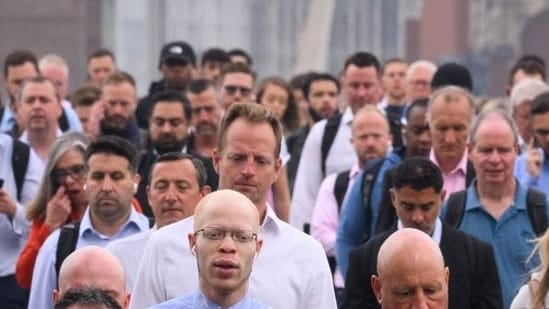The Bureau of Labor Statistics is not the only data collector to have had problems with jobs numbers: for years, the U.K.’s main economic statistics agency has faced growing scrutiny about how it collects employment data.
 PREMIUM The U.K.’s Office for National Statistics has struggled to find Britons willing to answer its questions.
PREMIUM The U.K.’s Office for National Statistics has struggled to find Britons willing to answer its questions.
In the U.K., however, criticism has been confined to questions of accuracy, rather than political motive.
President Trump on Friday fired the chief of the BLS, Erika McEntarfer, seizing on routine statistical revisions to claim that the agency is stacking the numbers against him for political reasons.
Explaining that decision Sunday, National Economic Council director Kevin Hassett cited the decline in response rates to BLS surveys as a problem it had failed to fix and made a direct comparison with the U.K.’s Office for National Statistics.
“In 2023, they had to for a while shut down the data agency of the U.K. for the same kinds of problems,” Hassett told NBC.
The ONS didn’t shut down in 2023, and continued to compile and publish a wide range of economic data, including figures related to the jobs market. But in October of that year the ONS suspended publication of the results of its flagship Labour Force Survey, which collates data on employment and economic inactivity, citing “quality concerns” caused by declining response rates.
“A statistics agency that can’t publish statistics is, in effect, shut down,” White House Deputy Press Secretary Kush Desai wrote in response to an emailed request for comment. “Hairsplitting doesn’t change the fact that there have been very clear issues with official economic data collection and reporting in both the United Kingdom and the United States after COVID – issues that the Administration is committed to finally addressing.”
Although it soon resumed publication of the LFS results, the ONS has struggled to find Britons willing to answer its questions, and faces an even greater challenge than the BLS. The LFS response rate was around 21% in the first quarter of this year, well below the 59.5% for the July U.S. jobs report.
The ONS has been trying to increase the number of responses to its survey, but it has not been easy.
“We are finding very high levels of flat refusal compared with prepandemic issues,” Ian Diamond, the then head of the ONS, told lawmakers in February.
As with the BLS, a lack of resources is one problem. In his February testimony, Diamond said the surge in inflation from 2021 had forced the ONS to make big savings in order to cover pay rises that were higher than those envisaged in its allocation from the government.
Part of the response has been to recruit more interviewers. Diamond estimated the ONS will need 1,500 interviewers to “to get great statistics now across all of our surveys” but was still “increasing towards 1,000.”
There has been some progress. In the three months through March, it secured responses from 69,847 individuals, up from 63,069 in October to December 2024. It says further improvements are needed, which might not be completed until 2027.
“The fact that we could be waiting another two full years until we see such a crucial dataset reach the proper standard is a major blow,” said Meg Hillier, who chairs the panel of lawmakers that oversees economic policy, in February.
Policymakers at the Bank of England have frequently drawn attention to the difficulties in setting borrowing costs without some of the most basic facts about a key determinant of output.
“It is a substantial problem – and not just for monetary policy – when we don’t know how many people are participating in the economy,” BOE Governor Andrew Bailey said in November.
Diamond resigned in May over health issues, shortly before the publication of a government review of the agency carried out by Robert Devereux, a retired civil servant, that highlighted failings that went beyond budget constraints.
“I believe most of the problems with core statistics result from inadequacies in the way ONS has made decisions, planned and budgeted, and managed risks,” Devereux wrote.
In late June, the ONS outlined a plan to “urgently” improve its economic data and surveys.
Devereux recommended that the job of running the ONS should be split, handing overall control to “someone with a track record of leading an operational business, indeed of turning round such an organisation.”
The government Tuesday appointed Darren Tierney, a civil servant veteran of over 20 years, to lead the ONS at “a critical time as it undergoes significant reforms to its organisational culture and management and as it improves the accuracy of key statistics.”
The ONS had previously recruited James Benford from the BOE, where he had been chief data officer, to serve as its new director general for economic, social and environmental statistics. Benford joined the agency Monday.
“We are already addressing with urgency the pressing issues with some of our key statistics and the surveys underpinning them,” a spokesperson for the ONS said.
While the ONS has faced scrutiny and even censure over its problems, senior politicians have stayed on the sidelines, and the agency has not been accused of manipulating the numbers for political purposes.
“It cannot be ruled out that U.K. politicians would be more critical of the ONS if the labor-market data suggested the unemployment rate was much higher, but we are skeptical that would be the case,” said Alex Kerr, U.K. economist at Capital Economics.
Write to Paul Hannon at paul.hannon@wsj.com and Ed Frankl at edward.frankl@wsj.com
